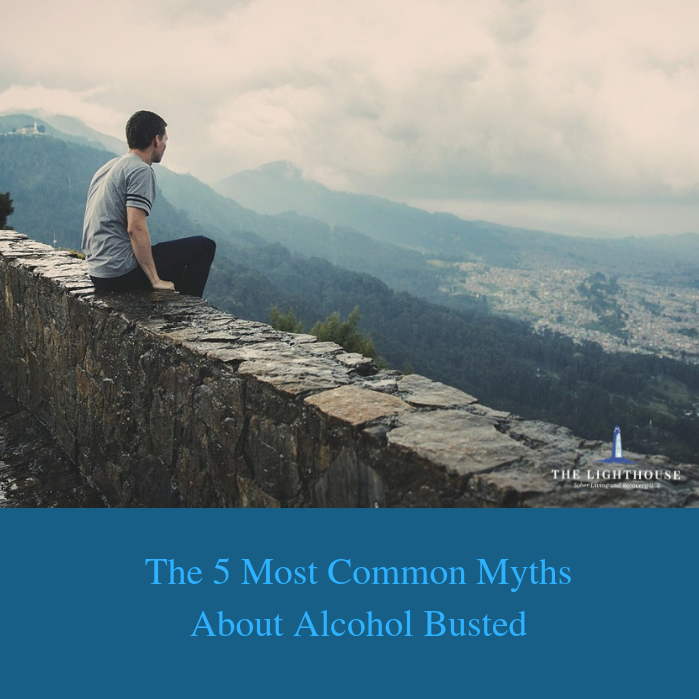The 5 Most Common Myths About Alcohol Busted
Urban legends, ghost stories, haunted hotels, and other myths have been passed down from generation to generation.
Everyone loves a good story. As societies grew, we learned to pass down our beliefs through story and myth.
Some myths are dangerous to our physical, psychological, social, and legal systems.
When something is confusing and has many unknowns, myths tend to be created and then believed as truths. Myths concerning alcohol can be named an urban legend.
Myths about the consumption of alcohol are just like the ghost stories you heard as a kid, except many of these myths were created in attempt to persuade another to not fear to get intoxicated, or to explain away drunken nights in the frat house, or to convince a business partner, colleague, or fiend into enjoying a liquid lunch, or to hide your alcoholism behind the veil of denial.
When you set out to learn to live a sober life you’ll have to change behaviors, thinking patterns, and beliefs. You should also get your facts straight about consuming alcohol. Many facts about the consumption of alcohol are dependent upon individual situations. Knowing how alcohol affects you as an individual is essential to your process of recovery.
What is equally important is dispelling common myths concerning alcohol to help assist you on the road to recovery.
Let’s take a look at 5 of the longest-running myths concerning alcohol and its consumption.
Myth 1: Living for the weekend- It’s FINE to BINGE drink on special occasions.
Have you ever heard the phrase: “It’s 5 O’clock somewhere?” It means that it’s happy hour somewhere in the world, so it’s okay to have a drink.
Do you regularly drink on the weekend, at birthday parties, weddings, New Year’s Eve or the infamous Wednesday evening before Thanksgiving Day?
Pattern or BINGE drinking is dangerous. It can lead to blackouts and has been linked to many major health concerns.
The CDC lists these severe health concerns can be a result of BINGE drinking:
-
Injuries of recklessness including automobile accidents, hazardous falls, or other fatalities.
-
Violent episodes including, domestic violence, assault, and homicide.
-
Sexually transmitted diseases. (STD’s)
-
Chronic disease: high blood pressure, heart disease, dementia, or stroke
-
Memory or learning problems
-
Alcohol poisoning
-
Alcohol dependence
Truth be told, it doesn’t matter how infrequently you binge drink you are putting your life and the lives of others at risk. If you plan to drink in excess of 4 or more alcoholic beverages, you are risking your health.
Sober-living will assist you in learning new behaviors to experience the richness of life without having to rely on alcohol or drugs to provide the fallacy of a good time.
Myth 2: Drinking in Moderation is SAFE.
There is conflicting research for or against this statement, hence the reason for alcohol consumption being so confusing. You may have heard a glass of red wine is good for the heart, or one to two drinks is excellent for the brain. Researchers are skeptical of these claims because these research studies have only looked at small control groups of the population.
According to the chief medical officer in England “drinking any level of alcohol carries a health risk for anyone.” The Mayo Clinic staff suggests that even if alcohol consumption has some positive health benefits, “it’s safest to avoid alcohol entirely — the possible benefits don’t outweigh the risks.”
The Mayo Clinic does not consider drinking to be safe when:
-
Diagnosed with an alcohol use disorder
-
Attempting to get pregnant or are pregnant
-
Taking prescription or over-the-counter medication
-
Diagnosis of liver or pancreatic disease
-
Suffered from a heart attack or stroke
Residing in a sober-living home can help you along the path to health and wellness. You will help you find an appropriate work/life balance.
With the assistance of a recovery coach and the supportive environment of sober living houses high functioning executives and business owners will learn to manage the stressful “attributes associated with work, family, and life.”
Besides transitioning back into life at your own pace sober-living homes will assist you in keeping doctors appointment visits, taking medications, eating properly and maintains an exercise regimen which fits your abilities,
Myth 3: Some drinkers can hold their Alcohol better than others.
This is not a sign of being better at something. Most often being able to handle your alcohol or it taking more drinks to reach the desired effect is the definition of tolerance.
Tolerance is a sign and symptom of early alcohol use disorder. The truth is people who can drink a lot without feeling intoxicated tend to drink more than those who get drunk quickly.
Some drinkers pride themselves on the ability to consume vast amounts of alcohol without worrying of adverse effects. High functioning executives who can consume unlimited drinks throughout the day and manage to get their work done, attend meetings, and close big deals are risking their personal and professional goals.
Developing a tolerance to alcohol should not be considered an achievement because it leads to:
-
Greater amounts of alcohol consumption
-
Alcohol Use Disorders
-
Many of the health risks previously discussed
-
Inability to properly function throughout the day.
Myth 4: Wine and beer are not as bad as hard liquors
The oldest myth of all myths about alcohol. The truth is all drinks are manufactured with the standard amount of alcohol.
A standard drink contains the same amount of alcohol.
These are standard drink sizes:
-
A 5-ounce glass of red or white wine
-
A 12-ounce beer
-
A 1.5-ounce shot of whiskey or liquor
Depending on who is mixing drinks can have played a vital role in the difference between drinking beer or whiskey. You might appear to become intoxicated faster when drinking mixed drinks, but it is not due to the strength of the actual alcohol.
It is due to how many 1.5-oz shots mixed into each drink.
Myth 5: Coffee can sober you up fast.
Coffee contains caffeine and has the ability to raise a person level of alertness and energy. Stimulants do not cause the body to process the amount of alcohol that is present.
In the UK researchers have found that caffeine present in coffee doesn’t affect the system at all. Researcher Tony Moss of the UK suggests, “while you might feel more alert from the caffeine, your hand-eye coordination and other motor skills will remain affected by the alcohol in your system.”
Time is the only cure for intoxication.
Conclusion:
Our relationship to alcohol is complicated and confusing. As medical and behavioral sciences study the physical and psychological effects of alcohol on the human body their findings consistently conclude the relationship to be hazardous to our health.
If you question the amount you have been drinking ask yourself:
-
What triggers you to drink?
-
How often do you drink?
-
The amount consumed of each sitting?
-
How alcohol changes your behavior?
If your answers cause alarm please speak with a healthcare professional about your alcohol consumption.
Admitting you have a problem with alcohol or drugs is the start. Having the courage to accept the situation and take action is your next step.
If you’d like to speak with us about transitioning into a sober living home, connect with us here.
Post your questions, concerns, or comments on Facebook and LinkedIn.
Please share, what other myths have you busted concerning alcohol.



